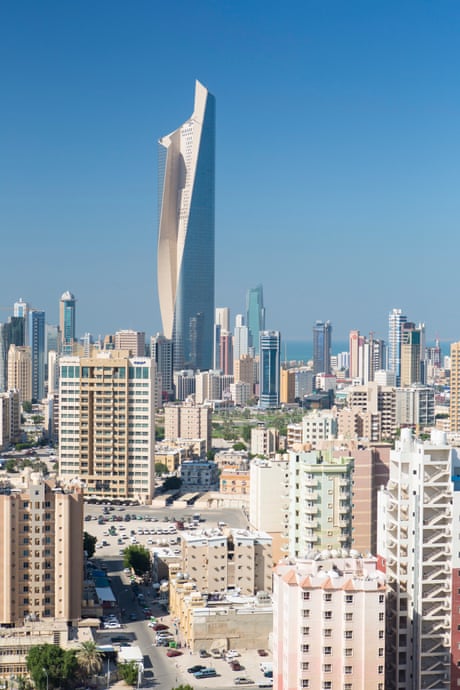
Mohammed Emwazi, the Briton identified as an Islamic State executioner, was once a star salesman for a Kuwaiti IT company, the Guardian has learned, in fresh revelations about the journey from normality to infamy of the man known as Jihadi John.
Emwazi, the Kuwaiti-born but London-raised graduate who features in Isis videos apparently beheading hostages in the Syrian desert, was quiet and rather withdrawn but had a natural gift for his work, a former boss in Kuwait City told the Guardian.
“He was the best employee we ever had,” the former boss said of the then 21-year-old. “He was very good with people. Calm and decent. He came to our door and gave us his CV.”
He said staff were surprised that a Londoner would want to come and work in Kuwait, as many of his peers in the region would be looking to make the journey in the opposite direction. The former boss added that, after a stellar probation period, the Briton disappeared completely in April 2010 after a trip to London.
“How could someone as calm and quiet as him become like the man who we saw on the news? It’s just not logical that he could be this guy.”
The Guardian has also obtained the most recent picture of Emwazi, above, prior to him travelling to Syria to join Isis. It was taken in Kuwait in early 2010.
Emwazi’s immediate family are from Kuwait, and his father Jassem, mother Ghaneyah, and eldest brother Omar were on Sunday taken in for routine questioning by Kuwaiti authorities.
Intelligence officers had told senior members of the Emwazi clan in the Tayma’a neighbourhod of Jahra district, 30 minutes drive from the city centre not to share information.

Emwazi’s Kuwaiti stint fills in gaps in what is known about the man, and portray him as a rather ordinary young IT graduate capable of holding down a steady job and impressing his mentors. It came shortly after he is believed to have come in contact for the first time with intelligence services suspicious of his affiliations following a trip to Tanzania.
In Kuwait, Emwazi was given a three-month probation period, earning 300 Kuwaiti dinars (£657) per month, plus 50 dinars (£109) expenses, and promised five per cent commission on business he brought in.
The modest salary was at odds with what the IT company thought he could earn in the UK, or Europe, and his employers were initially puzzled about why he had sought work with them.
“Muslim and Arabic people travel from here to London or the US, and they stay two years looking for a job or even a place to stay,” said one former boss. “It always puzzled me. Why would he come here?”
“But it seemed as though he faced some problems, maybe family, social or psychological. I didn’t really ask. He wanted a good job (in London) and he wanted to get married, but he couldn’t and it made a problem for him.”
Emwazi is the most visible of hundreds of Britons to have travelled to the region in recent months to join the burgeoning Isis movement as it seeks to create a caliphate across a swathe of desert in Syria and Iraq. Scotland Yard said that 60 British women and girls, including 18 teenagers, have travelled to join Isis. CCTV footage released on Sunday shows three British schoolgirls who disappeared last month waiting at a bus station in Istanbul for onward travel to the border with Syria.
Emwazi is believed to have travelled to Syria in 2013. Former colleagues in Kuwait City returned to work on Sunday after a three-day holiday, having discovered that their one-time recruit was now one of the world’s most wanted men – the hooded face of a terror organisation, who ritualistically kills captives on videos that are tailored to shock the world.
During his brief stint at the IT company, he twice requested emergency family leave to return to the UK. In simple english handwriting he wrote ‘London’ as a destination for a seven-day stint on 10 January 2010.
His second request was made days before he left for good on 25 April that year. “We never saw him again,” said his employer. “But he did send us back his sim card in the post.” Soon after his return to London, counter-terrorism officials detained him and prevented him from returning to Kuwait.
Asked to reflect on how the young sales representative who persuaded people to buy their IT products became one of the world’s most wanted men, the employer said: “I have no answers for this. He wasn’t sociable. He was always earnest. He didn’t smile. But he wasn’t bad.
“We have Indian Christians working at this company who have been here for 17 years,” he said. “They are treated the same as everyone. You must deal with people well. You must not use force. Maybe he fell into the wrong hands when he went back.”
Asked to send a message to his former protege, the employer said: “I would say to him one thing: ‘Fear God, because Islam prohibits what you do.’ ”
Mosque leaders on Sunday refused to talk about the unmasking of Emwazi, which has shocked Kuwait, where security forces have worked intensively over the past three years to stop citizens being drawn to fight alongside Isis in Syria and Iraq.
The Emwazi family had originally lived in the area before leaving for the UK in the early 1990s, owing to the fact that part of the clan originally hailed from Iraq, which had invaded Kuwait in 1990.
Emwazi’s parents are thought to have returned to Jahra from London. Classed asBidoon (the word means ‘without’ in Arabic, in reference to their stateless designation), the family – and much of the extended clan – have few of the rights enjoyed by citizens and live relatively frugal lives in one of the richest per capita countries in the world.































